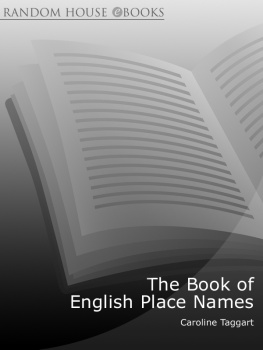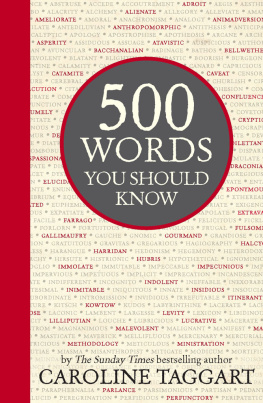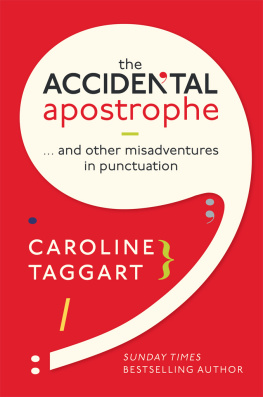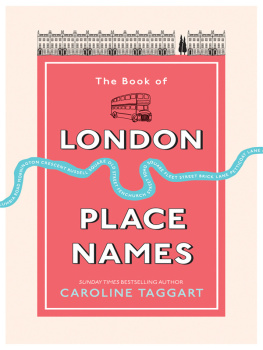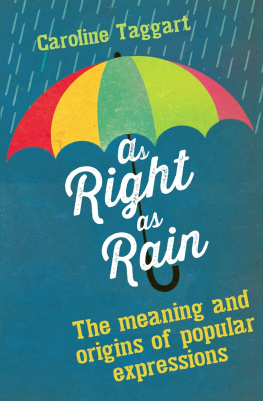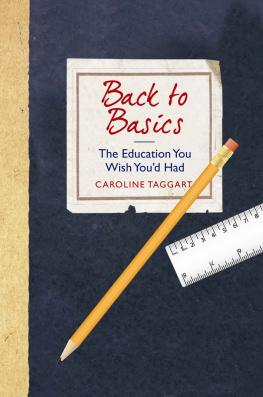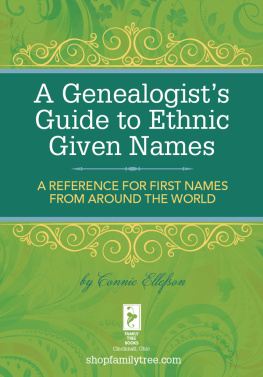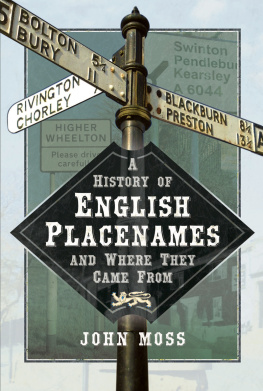
This eBook is copyright material and must not be copied, reproduced, transferred, distributed, leased, licensed or publicly performed or used in any way except as specifically permitted in writing by the publishers, as allowed under the terms and conditions under which it was purchased or as strictly permitted by applicable copyright law. Any unauthorised distribution or use of this text may be a direct infringement of the authors and publishers rights and those responsible may be liable in law accordingly.
Version 1.0
Epub ISBN 9781409034988
www.randomhouse.co.uk
1 3 5 7 9 10 8 6 4 2
Published in 2011 by Ebury Press, an imprint of Ebury Publishing
A Random House Group company
Copyright Caroline Taggart 2011
Caroline Taggart has asserted her right to be identified as the author of this work in accordance with the Copyright, Designs and Patents Act 1988
All rights reserved. No part of this publication may be reproduced, stored in a retrieval system, or transmitted in any form or by any means, electronic, mechanical, photocopying, recording or otherwise, without the prior permission of the copyright owner
The Random House Group Limited Reg. No. 954009
Addresses for companies within the Random House Group can be found at
www.randomhouse.co.uk
A CIP catalogue record for this book is available from the British Library
ISBN 9780091940430
To buy books by your favourite authors and register for offers visit
www.rbooks.co.uk
CONTENTS
For Niki and Julia, without whose generous purchasing power
my books wouldnt have been anything like as successful
as they have been and because its Wednesday.
ACKNOWLEDGEMENTS
I am, as always, most grateful to all the friends and relations who gave me encouragement and, this time, suggestions for places to include. Special thanks to Peter for lending me books and coming up with the story of Twenty and to Heff for wondering about Indian Queens. Thanks also to Rebecca for thinking this book was a good idea, to Andrew for taking it on and to Liz, Kasi and everyone else at Ebury for making it happen.
ABOUT THE BOOK
Do you know your ham from your ton? Your wick from your bury? Who founded your town, conquering Romans or ancient Celts?
The Book of English Place Names is a witty and informative guide to the meanings behind the names of Englands towns and villages. From ancient legends of giants and knights, mysterious sacred sites, and powerful rulers whose names are still enshrined in the places they ruled, discover the rich history behind our place names.
Starting with scattered Celtic tribes, through to Norman conquerors, and right up to the Industrial Revolution, learn how generations of our ancestors lived, worked, travelled and worshipped. Region by region, Caroline Taggart uncovers hidden meanings that, together, tell the fascinating story of how we made England.
ABOUT THE AUTHOR
Caroline Taggart worked in publishing as an editor of popular non-fiction for 30 years before being asked to write I Used to Know That, which became a Sunday Times bestseller. Her later books include My Grammar and I (or should that be Me?) and Her Ladyships Guide to the Queens English. As a result, she has appeared frequently on BBC Breakfast and on national and regional radio, talking about language, grammar and Pythagoras theorem. With her editorial hat on, she also visits writers conferences around the country, advising would-be authors on how to get published and learning what their place names mean.
INTRODUCTION
Its a proud boast among us British that we havent been successfully invaded since 1066. We fended off Napoleon, Hitler and goodness knows who else besides. What we tend to overlook, though, is how often we were invaded before 1066. Starting in AD 43, four waves of invaders settled in what the Romans called Britannia (thats four if you lump each group together; many, many more if you choose to separate the Angles from the Saxons from the Jutes and if you count the number of individual Viking incursions). Each brought its own culture, its own language and its own way of doing things. As the power of each waned, as armies withdrew, royal lineages died out and yesterdays conquerors became todays settlers, mingling and intermarrying with the people they had overthrown, they left behind one indelible marker: the names they had given to places.
The name of a place gives us hints not only about who used to live there, but about how they made their living, who their leaders were, what gods they worshipped. It tells us why people chose to settle in a particular spot rather than in another just down the road perhaps there was a ford at A; perhaps B was a farmable valley in a mountainous area and C a hilltop site that was easy to defend. In the most primitive cultures, place names are basic: if you never move far from home, its enough to call your local river the river, because it is the only one or the only one that matters. (The same attitude leads Londoners to routinely call the Thames the river to this day.) As civilisation develops, however, place names need to be more sophisticated. Once you start trading with nearby villages, you need to be able to tell them apart, even if you do nothing more inventive than name them North Village, Middle Village and South Village (thats where all those Nortons, Middletons and Suttons come from). A village with one outlying farm can refer to the outlying farm. Once there are two of them, you need to come up with names such as the outlying farm by the bridge (Brigstock) and the outlying farm by the road (Radstock). If there are two southerly villages, they might become the southern village by the bridge (Sutton Bridge it isnt always rocket science, this place-naming business) and the long southern village (Long Sutton). A village large enough to have two churches might split in two and become, say, Chalfont St Peter and Chalfont St Giles. And so it goes on. Some English place names date back two thousand years, a few were created for new towns in the nineteenth century, and there are many thousands in between but all have a story to tell.

Before we get into those stories, though, lets have a quick look at the people who created them.
In the beginning, there were the Celts or Britons. (Actually, the Celts werent the first inhabitants of Britain, which is why youll occasionally see the word pre-Celtic in the entries later on, but we know almost nothing about them and they were a long time ago, so ) Its an over-simplification to speak of the Celts as one people, because they were made up of a number of tribes who fought a great deal among themselves. For our purposes, though, they had one important thing in common: their language. It differed from place to place, as local dialects differ the world over, but it was fundamentally the same language. Its descendants are Welsh, Cornish, Gaelic and Irish and well call it Old Celtic.
Next page
